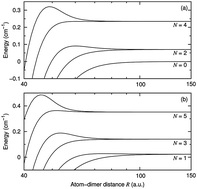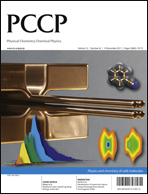Long-range interactions between ultracold atoms and molecules including atomic spin–orbit
Abstract
We investigate theoretically the long-range electrostatic interactions between a ground-state homonuclear alkali-metal dimer and an excited alkali-metal atom taking into account its fine-structure. The interaction involves the combination of first-order quadrupole–quadrupole and second-order dipole–dipole effects. Depending on the considered species, the atomic spin–orbit may be comparable to the atom–molecule electrostatic energy and to the dimer rotational structure. Here we extend our general description in the framework of the second-order degenerate perturbation theory [M. Lepers and O. Dulieu, Eur. Phys. J. D, 2011] to various regimes induced by the magnitude of the atomic spin–orbit. A complex dynamics of the atom–molecule may take place at large distances, which may have consequences for the search for an universal model of ultracold inelastic collisions as proposed for instance in the study of Z. Idziaszek and P. S. Julienne [Phys. Rev. Lett.104, 2010, 113202].

- This article is part of the themed collection: Physics and chemistry of cold molecules

 Please wait while we load your content...
Please wait while we load your content...